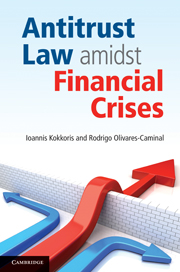Book contents
- Frontmatter
- Contents
- Foreword by Philip Lowe
- Foreword by Frederic Jenny
- Preface
- Table of cases
- Table of treaties and other international instruments
- Introduction
- 1 Introduction to competition law: EU, US and UK
- 2 Some notes on crises
- 3 Failing-firm defence
- 4 Efficiencies
- 5 Crisis cartels
- 6 State aid (Phedon Nicolaides)
- 7 Competition enforcement in periods of crisis
- 8 Conclusion
- Index
1 - Introduction to competition law: EU, US and UK
- Frontmatter
- Contents
- Foreword by Philip Lowe
- Foreword by Frederic Jenny
- Preface
- Table of cases
- Table of treaties and other international instruments
- Introduction
- 1 Introduction to competition law: EU, US and UK
- 2 Some notes on crises
- 3 Failing-firm defence
- 4 Efficiencies
- 5 Crisis cartels
- 6 State aid (Phedon Nicolaides)
- 7 Competition enforcement in periods of crisis
- 8 Conclusion
- Index
Summary
Ronald [Coase] said he had gotten tired of antitrust because when the prices went up the judges said it was monopoly, when the prices went down they said it was predatory pricing, and when they stayed the same they said it was tacit collusion.
Prof. William M. LandesIntroduction
Competition law is a set of rules, disciplines and judicial decisions maintained by governments relating either to agreements between firms that restrict competition or to the concentration or abuse of market power on the part of private firms. This chapter will briefly present the competition legislation in the three jurisdictions: the EU, the USA and the UK. The chapter will not purport to provide an exhaustive analysis, but an overview of the legislative means that are employed in these jurisdictions to address anti-competitive conduct. The subsequent chapters will analyse certain issues of relevance in greater detail (e.g. failing-firm defence, efficiency assessment, crisis cartels, state aid).
Before analysing the competition legislation in the three jurisdictions mentioned above, it is worth noting the development of competition legislation in some other jurisdictions. In Canada in 1910 the Parliament enacted the Combines Investigation Act, which was superseded in 1919 by the Combines and Fair Prices Acts and the Board of Commerce Act. These last were replaced in 1923 by the Combines Investigation Act.
- Type
- Chapter
- Information
- Antitrust Law amidst Financial Crises , pp. 14 - 71Publisher: Cambridge University PressPrint publication year: 2010



